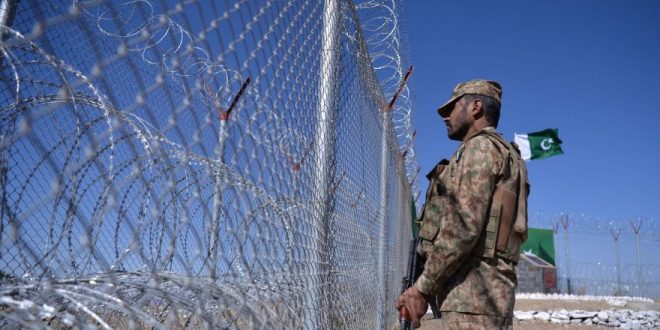AT News
KABUL – In the past two years, Pakistan’s relations with Afghanistan have deteriorated significantly, with increasing signs of Islamabad’s interference in its western neighbor’s affairs. Afghanistan has repeatedly accused Pakistan of various activities, including cross-border firing, the erection of illegal structures, border fencing, and violations of Afghan airspace.
While Pakistan claims these actions are part of its counter-terrorism efforts in the border regions of Khyber Pakhtunkhwa (KP) and Balochistan, it is increasingly evident that the real motive behind these operations is to assert Pakistani influence over the disputed Durand Line border demarcation.
Recent incidents have highlighted the impact of these tensions on the diplomatic offices of both countries. In September 2023, there were reports of Pakistani security personnel assaulting a guard at the Afghan embassy, leading to a strong protest from the Afghan embassy to Pakistan’s Ministry of Foreign Affairs. Similarly, in December 2022, the Pak Embassy in Kabul was targeted by unknown assailants, resulting in injuries to one of the Pakistani guards. These attacks on diplomatic missions have further strained bilateral relations.
The mistreatment of Afghan refugees on the outskirts of Islamabad is another contentious issue. The Afghan Embassy in Islamabad recently claimed that Pakistani police have detained over a thousand migrants, with some detainees losing their lives in custody. Pakistani police continue to conduct raids on the homes of Afghan migrants, detaining many, despite possessing migration and travel documents. The situation is not limited to Islamabad but has been reported in Sindh province, particularly in Karachi.
Despite the suffering of Afghan migrants, Islamabad has issued them an ultimatum to leave the country by the end of October 2023, accusing them of involvement in funding and facilitating terrorist activities. The Pakistani government has long accused the Taliban of supporting terrorists linked to the outlawed Tehreek-e-Taliban Pakistan (TTP), while Kabul denies these allegations.
In an attempt to address these challenges and ease tensions, the foreign ministers of both countries held a meeting on October 5 in Tibet during the third Trans-Himalaya Forum for International Cooperation in China’s autonomous region. However, a clear resolution to the problem remains elusive.
The situation is further complicated by Pakistan’s actions against Afghans in border areas and its ongoing efforts to assert influence, especially in the wake of the Taliban’s independent policies following the regime change in 2021. The recent targeting of Afghan citizens and missions inside Pakistan has further complicated the relationship, with Taliban leaders making provocative statements about Pakistan and its operations. It seems that adding challenges to the dynamics will only make the relationship more problematic for Pakistan.
 Afghanistan Times
Afghanistan Times




